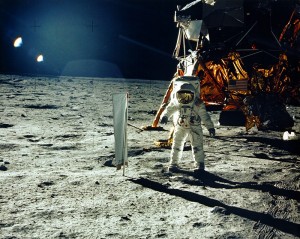The 40th anniversary of humanity’s first steps on the moon is here, and the event is inspiring commentary all over the world.

Many people are looking back on the Apollo 11’s landing with nostalgia – particularly those who were able to witness or participate in it. Others are wondering what happened to manned spaceflight in the intervening years, or reflecting on the advances made since 1969.
Whatever one’s personal opinion, the topic is everywhere at the moment. NASA has also released remastered footage of the original event (the originals were accidentally destroyed), and a transcript of the landing can be found here.
The Science Media Centre approached New Zealand experts for their take on the moon landing – what it meant to and for them, and all of us.
Peter J Beck, Company Director and CEO of Rocket Lab Ltd, comments:
“I was not born when the moon landings took place. However one does not have to be present at an event for it to make a profound impact in their life’s direction.
“I have always considered the moon landings as being an amazing accomplishment, but as you work through the challenges of space flight for yourself it truly becomes obvious what a monumental scientific, engineering and human achievement the landings actually were. I have been fortunate enough to touch a Saturn 5 rocket and talk to some of the men who created it. The technology that these men developed in such a short time frame is still state of the art 40 years later in many cases. The moon landings for me are a demonstration of what man can achieve when challenged and serves as an inspiration as Rocket Lab strives to reach space later this year.”
Mark Rocket, Company Director of Rocket Lab Ltd, comments:
“The Apollo programme is recognised by many people as America’s greatest legacy. Apollo precipitated a leap in technology and helped us view the world from a new perspective.
“It’s also a story of lost opportunity. Little has happened in manned spaceflight exploration since Eugene Cernan of Apollo 17 stepped off the moon on December 14th, 1972. What happened to the reasonable expectations of Arthur C Clark’s 2001? Where are the orbital flights, space hotels and moon bases?
“In this decade, a new wave of private space industry participants are aiming to pick up where Apollo left off, to make space truly accessible. There is a clear need to find out more about where we live and to harness the abundant energy and mineral resources of our Solar System. The next two decades will be an exciting ride.”
Richard Hall, president of the Phoenix Astronomical Society and one of NZ’s leading astronomers, comments:
“I like to use the words of Arthur C. Clark from his ‘2001 Space Odyssey to describe the day on which humans first set foot on the Moon. It goes something like this: It was the day that the inhabitants of Earth crawled out of their planetary cradle.
“For me it was the day when science fiction became science fact. It was beginning of a new era of discovery and adventure – the physical exploration of the universe in which, through modern technology, we can all be part. This in turns lends itself to the prospect of discovering other Earth-like worlds and, encountering alien civilizations…which will be our greatest challenge of all time.”
Alista Fow, Chair of the Hamilton Applied Astrophysics Club, comments:
“To me the moon landing is a defining moment in my life. It shows me that humanity is only limited by its imagination. These voyages changed the way that we look at the Earth and it allowed us to see our place in the Universe.”
Dr Ian Bond, of the Institute for Information and Mathematical Sciences at Massey University, comments:
“I don’t remember the first Moon landing (Apollo 11), but I do remember the ones after that. In particular, I remember at primary school we were allowed to watch the TV coverage of Apollo 14 and I was totally captivated by it. That was a defining moment for me. The Apollo program was what sparked my interest in space related topics which later gave way to an interest in astronomy.”
Matthew Pavletich, of the NZ Spaceflight Association, comments:
“To me, the mission of Apollo 11 has provided lifelong inspiration. Although Space was yet another arena for the ‘Cold War’ between America and the then-Soviet Union, I believe the landing and first walk on the Lunar surface transcended the squabbles of Politics and became something very special and timeless. Space exploration is comparatively cheap compared to invading countries or developing nuclear weapons systems. Between 1960 and 1970, the U.S. and Russia spent 200 times the amount of money on nuclear weapons than Project Apollo’s budget for the same time period. I’ll let the individual decide which was of more use to mankind.”